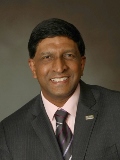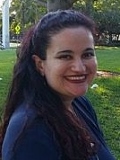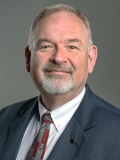|
For each newsletter, I invite members to answer a set of questions:
-
What is your favorite platform?
-
What is the one indispensable tool/webpage?
-
What is your most unexpected source of information about CALL?
-
What was your favorite CALL creation?
-
What are you working on now?
-
What area would you like to see developed/researched?
-
In a sentence, what advice would you give to a newbie starting out in CALL?
I hope you enjoy this opportunity to make CALL connections with
TESOL leaders as they share experiences, offer advice, and celebrate
inspirations. Please e-mail me if you
have suggestions or contributions to Making Connections.
Andy Curtis
 From 2015 to 2016, Andy Curtis served as the 50th president of
TESOL International Association, and he is the current immediate past
president. He is based in Ontario, Canada, from where he works as an
independent education consultant for language teaching and learning
organizations worldwide. From 2015 to 2016, Andy Curtis served as the 50th president of
TESOL International Association, and he is the current immediate past
president. He is based in Ontario, Canada, from where he works as an
independent education consultant for language teaching and learning
organizations worldwide.
Affiliation: Graduate School of Education, Anaheim University, California, USA
Years in the CALL-IS: I'm not sure how many
years I've been in the CALL-IS, but I think at least 10 years, and maybe
more.
Q: What is your favorite platform?
A: Technologically, I "grew up" on a PC, but some years ago, I
was persuaded to switch to Mac, which I like. But I get tired of that
look and the falling intonation, from tech support in different
countries, when they see I have a Mac. "Oh" they say. Then walk
away…
Q: For you, what is the one indispensable tool/webpage?
A: Sorry to sound so geeky-academic, but I don't know what I'd
do without Google Scholar these days. It's even one of the reasons why I
don't do so much work in Mainland China now, since they cut off
all-things-Google. Not to mention Gmail, YouTube, and everything else
that's being banned there now.
Q: What is your most unexpected source of information about CALL?
A: My 29-year-old son, Jack, who's an engineer and who knows
nothing about CALL. But he's great with online technologies, so I often
end up asking him for help. And even though he (too) really dislikes
Macs, he'll still help me when he can (while complaining about
all-things-Apple).
Q: What was your favorite CALL creation?
A: I've not had a chance to use them much yet, but I saw some
CAPT—computer-assisted pronunciation training—programs demonstrated
recently, and because teaching pronunciation is not one of my strengths,
I liked what I saw, and I plan on trying out some CAPT programs later
this year.
Q: What are you working on now?
A: Most of my time with ed tech now is connected to teaching MA
TESOL and MEd courses online, including an MEd course I'm teaching now
called Innovative Curriculum Development, offered by Queen's University
in Canada. I've also been trying to decide if I like flipped classrooms
or not.
Q: What area would you like to see developed/researched?
A: As a language learner, I'd very much like to see some better
programs for teaching and learning the tones of tonal languages like
Mandarin Chinese and Cantonese. For those of us who come from nontonal
languages, like English (and who may be a bit "tone deaf") that would be
great!
Q: In a sentence, what advice would you give to a newbie starting out in CALL?
A: Don't be afraid. Other than dropping the actual device, you
can't "break" the technology, so "have at it." Be patient, as the
technology can sometimes be frustrating. And always go to class with a
Plan B, as the technology can let you down, sometimes, at the worst
possible time!
Q: What is your funniest CALL-related incident?
A: It's not "funny ha-ha," but I have learned to smile when I'm
struggling with some CALL-related technology in the classroom, and one
(or more) of the learners comes to the rescue. They love it when they
know more about something than their teacher, so the teaching-learning
roles are reversed.
Luciana C. de Oliveira
 Luciana C. de Oliveira, PhD, is chair and associate professor
in the Department of Teaching and Learning in the School of Education
and Human Development at the University of Miami, Florida. She's
president-elect (2017–2018) of TESOL International
Association. Luciana C. de Oliveira, PhD, is chair and associate professor
in the Department of Teaching and Learning in the School of Education
and Human Development at the University of Miami, Florida. She's
president-elect (2017–2018) of TESOL International
Association.
Affiliation: University of Miami, Florida, USA
Years in the CALL-IS: I am a past presenter
in the Electronic Village. My main IS is Second Language Writing, and
secondary ISs are Teacher Education and Nonnative English Speakers in
TESOL (NNEST).
Q: What is your favorite platform?
A. PC, without a doubt!
Q: For you, what is the one indispensable tool/webpage?
A: The Purdue OWL—I check it almost daily when doing references
in APA, and it is an essential webpage that I recommend to all of my
graduate students!
Q: What is your most unexpected source of information about CALL?
A: People! I try to attend the Electronic Village presentations
at the TESOL convention each year to learn more from people doing
interesting things!
Q: What was your favorite CALL creation?
A: I'm not sure this qualifies as a CALL creation, but I really
love audio feedback! I've used it multiple times in my online courses
and it is so great to provide audio feedback on students’ assignments. I
feel so much more connected to them. I have also written a lot about
this with my collaborator Larisa Olesova.
Q: What are you working on now?
A: I am actually working on a chapter on feedback in
asynchronous online environments. Here is the full reference:
Olesova, L., & de Oliveira, L. C. (in press).
Usingfeedback in ESL and EFL asynchronous online environments. In J.
Perren, K. Kelch, J-S Byun, S. Cervantes, & S. Safavi (Eds.), Applications of CALL theory in ESL and EFL environments. IGI Global.
I'm also finishing up an invited commentary for the Journal of Adolescent and Adult Literacy:
de Oliveira, L. C., & Athanases, S. Z. (in press). A
framework to re-envision instructional scaffolding for linguistically
diverse learners. Journal of Adolescent and Adult
Literacy.
Q: What area would you like to see developed/researched?
A: I would love to see more work on feedback tools, especially
for second language writing, that are more automated that we could
easily send to our students.
Q: In a sentence, what advice would you give to a newbie starting out in CALL?
A: Don't be afraid to try out new things.
Mark Algren
 Mark Algren has been a teacher and program administrator in
intensive English programs for more than 30 years. He's taught in Hong
Kong, Saudi Arabia, the United Arab Emirates, and the United States. His
involvement with TESOL International Association began while working on
his MATESOL at Southern Illinois in 1981–82. He's been involved with
the association in many capacities, including presenting, writing, and
teaching; serving on committees, steering committees, task forces, and
the Board of Directors; and, finally, serving as president in 2009–2010.
Mark is the recipient of the James E. Alatis Award for Service to TESOL
for 2017. Mark Algren has been a teacher and program administrator in
intensive English programs for more than 30 years. He's taught in Hong
Kong, Saudi Arabia, the United Arab Emirates, and the United States. His
involvement with TESOL International Association began while working on
his MATESOL at Southern Illinois in 1981–82. He's been involved with
the association in many capacities, including presenting, writing, and
teaching; serving on committees, steering committees, task forces, and
the Board of Directors; and, finally, serving as president in 2009–2010.
Mark is the recipient of the James E. Alatis Award for Service to TESOL
for 2017.
Affiliation: Center for English Language Learning,
University of Missouri, Columbia, Missouri, USA
Years in the CALL-IS: Active involvement in
the CALL-IS from 1994 through about 2005, concurrently with Intensive
English Programs IS and Program Administration IS.
Q: What is your favorite platform?
A: I started life in the CALL-IS as a Mac person, participating
in a Preconvention Institute (PCI) led by Elizabeth Hanson-Smith in
1994 in Baltimore: How to Establish a Computer Lab. I codirected a Mac
lab, until we were pushed into using PCs around 2006. A favorite? Not
really; that would ignite a platform war. My job isn't to push a
platform but to help students learn to use what they need to be
successful.
Q: For you, what is the one indispensable tool/webpage?
A: One? Just one???? How could there ever be just one? My
indispensable tool is subscribing to a wide range of education sites and
keeping a log of interesting and helpful sites that will serve my
students. I've got a nine-page bibliography of recommendations that I
give to teachers when I do workshops now.
Q: What is your most unexpected source of information about CALL?
A: I'm not surprised by any source any more. CALL stuff pops up
everywhere. You just have to be attentive enough to catch it when it
goes by.
Q: What was your favorite CALL creation?
A: I think it was the very first "interactive" quiz I created
on a computer in a college education course in 1975. I learned how to
program, create (mildly) engaging items, and give responses to students
on both right and wrong answers. I was hooked. However, it wasn't until I
started working with real CALL stuff in Saudi Arabia in the early 1990s
that I started to realize the power of CALL.
Q: What are you working on now?
A: Mostly right now I work on keeping my nose above water. I
recently had the great pleasure of teaching some Iraqi English teachers
about the joys of CALL and 10-finger typing.
Q: What area would you like to see developed/researched?
A: In my travels, some nonnative-speaking teachers expressed
their appreciation for learning about pedagogy, but also asked about how
they can improve their own language skills. I suppose this ties in to
online language education. What can be shown to be effective teaching
(via CALL) for helping instructors develop their own language
proficiency?
Q: In a sentence, what advice would you give to a newbie starting out in CALL?
A: I'd recommend that newbies in CALL get acquainted with doing
a needs analysis. How do you find what will help students? Technology
provides fun and engaging ways to attract students into language
learning, but you have to be able to discern what is going to help
students, and find ways to help teachers make the technology accessible
to students and to understand its benefits (not just its entertainment
value).
Q: What is your funniest CALL-related incident?
A: There're actually quite a few. But for this, I have to get
in my “way back” machine to about 1994 or 95. We used a Mac treasure
hunt game to teach students how to use a mouse because most of our
students had never touched a computer before. We had mouses with roller
balls in them, and we had mouse pads. One young woman was almost in
tears one day. I asked her, “What's wrong?” She said she was trying and
trying to point and click at something but her mouse was on the edge of
the mouse pad and she couldn't go any further. I showed her how to pick
the mouse up and move it back onto the pad and roll it again. While it
was amusing to me, it helped me realize how challenging the unknown can
be.
Suzan Stamper is senior lecturer and English
language team leader at Yew Chung Community College in Hong Kong. She
has been a CALL-IS member since 1995. | 
